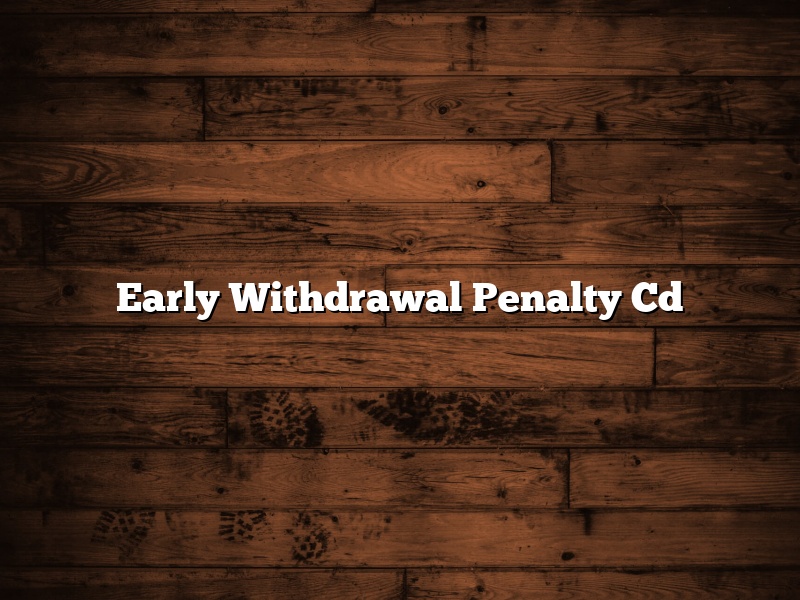If you’re considering withdrawing money from a certificate of deposit (CD) before it matures, you’ll likely have to pay an early withdrawal penalty. This fee, typically expressed as a percentage of the amount withdrawn, is designed to discourage investors from pulling their money out of CD prematurely.
The early withdrawal penalty for CDs can range from a few months’ interest to as much as a full year’s interest. So, if you’re thinking of cashing in your CD before it matures, be sure to weigh the cost of the early withdrawal penalty against any potential benefits.
One thing to keep in mind: The early withdrawal penalty is usually levied only on the amount withdrawn, not on the full amount of the CD. So, if you have a $10,000 CD and withdraw $2,000, you’ll only be penalized on the $2,000, not on the full $10,000.
If you’re thinking of withdrawing money from a CD, it’s important to understand the early withdrawal penalty and how it might affect your decision. Contact your financial institution for more information.
Contents [hide]
Is it worth paying an early withdrawal penalty to break my CD?
It can be tempting to break a certificate of deposit (CD) when interest rates are high, but is it worth paying an early withdrawal penalty?
The answer depends on how much the penalty costs and how much higher the interest rates are on other investments.
For example, if you have a CD with a 2 percent interest rate and can invest in a bond fund that pays 5 percent, it may be worth paying the early withdrawal penalty to break the CD.
However, if you have a CD with a 5 percent interest rate and can only invest in a bond fund that pays 3 percent, it is not worth paying the penalty to break the CD.
In general, it is not worth paying an early withdrawal penalty to break a CD if the interest rate on the new investment is less than the penalty.
How much does it cost to withdraw a CD early?
When you make the decision to withdraw your money from a CD before the maturity date, you may be subject to an early withdrawal penalty. This penalty is typically a percentage of the amount that you withdraw, and it can be costly.
The early withdrawal penalty for a CD can vary depending on the bank or credit union that you have the account with. Typically, the penalty ranges from one to six months of interest, but it can be as high as a full year of interest.
If you are thinking about withdrawing your money from a CD before the maturity date, it is important to understand the early withdrawal penalty. This will help you decide if the penalty is worth the cost of withdrawing the money.
Can a bank waive a CD Penalty?
There are a few things to keep in mind when it comes to CD penalties. The bank may be willing to waive the penalty in some cases, but there are also a few things you can do to help reduce or avoid the penalty.
One thing to keep in mind is that the bank may be more likely to waive the penalty if you have been a customer for a long time. They may also be more likely to waive the penalty if you have a good relationship with the bank.
You may also be able to reduce or avoid the penalty if you withdraw your money early. In some cases, the bank may charge a penalty, but it will be less than the penalty for withdrawing the money after the CD has matured.
If you think you may need to withdraw your money early, it is important to speak with the bank about the potential penalties. This will help you to understand the potential costs and make the best decision for your financial situation.
Does closing a CD hurt your credit?
When it comes to your credit, there are a lot of things to keep track of. One of those things is closing a CD. Does closing a CD hurt your credit?
The short answer is no, closing a CD does not hurt your credit. However, there are a few things to keep in mind.
First, when you close a CD, it will impact your credit utilization ratio. This is the amount of credit you are using compared to the amount of credit you have available.
If you close a CD that has a high balance, it will impact your credit utilization ratio more than if you close a CD with a low balance. This is because your total credit utilization ratio is based on your total credit limit, not your individual credit limits.
So, if you have a $10,000 credit limit and you have a $5,000 balance on one of your credit cards, your credit utilization ratio is 50%. However, if you close a CD with a $5,000 balance, your credit utilization ratio will jump to 100%.
This can be a negative thing for your credit score, as a high credit utilization ratio can indicate that you are struggling to manage your debt.
However, if you have a low credit utilization ratio, closing a CD will not have a big impact. In fact, if your credit utilization ratio is below 30%, closing a CD may actually help your credit score.
So, if you are thinking about closing a CD, make sure to consider your credit utilization ratio. If you have a high credit utilization ratio, you may want to hold off on closing the CD. If you have a low credit utilization ratio, you can go ahead and close the CD without any negative impact on your credit score.
How is CD penalty calculated?
When a company issues a certificate of deposit (CD), it agrees to pay a penalty if the CD is redeemed before the maturity date. This penalty, which is usually a percentage of the amount invested, is known as the certificate of deposit penalty.
The certificate of deposit penalty is calculated based on a few factors, including the amount invested, the maturity date, and the interest rate. Generally, the longer the CD maturity date, the higher the penalty will be. And, the higher the interest rate, the lower the penalty will be.
Here’s how it works: Let’s say you invest $1,000 in a CD with a six-month maturity and a 2% interest rate. If you redeem the CD before it matures, you will be charged a penalty of $10 (1% of $1,000).
But, if you invest $1,000 in a CD with a two-year maturity and a 4% interest rate, you will be charged a penalty of $40 (4% of $1,000).
As you can see, the longer the CD maturity date, the higher the penalty will be. And, the higher the interest rate, the lower the penalty will be.
If you have any questions about how the certificate of deposit penalty is calculated, please contact your financial advisor.
Does cashing in a CD count as income?
When it comes to taxes, there are a lot of things that can be confusing for taxpayers. One question that sometimes comes up is whether cashing in a certificate of deposit (CD) counts as income. The answer to this question is not always clear, but in general, cashing in a CD will be considered taxable income.
There are a few exceptions to this rule. If you cash in a CD that was given to you as a gift, for example, the income from the CD will not be taxable. And if you use the proceeds from the CD to purchase another CD, the income from the new CD will not be taxable.
But in most cases, cashing in a CD will be considered taxable income. This means that you will need to report the amount you received from the CD on your tax return, and you may be subject to tax on that income.
There are a few things to keep in mind if you are considering cashing in a CD. First, you will need to calculate the amount of income you received from the CD. This will be the amount you received minus any penalties or fees you paid to cash in the CD.
You will also need to report any interest you earned on the CD on your tax return. This interest will be taxable, whether you cash in the CD or not.
Finally, you should keep in mind that the rules for cashing in a CD can vary from state to state. So if you are considering cashing in a CD, it is important to check with your state’s tax authority to see if there are any specific rules that apply.
In general, cashing in a CD will be considered taxable income. But there are a few exceptions, and you should check with your state’s tax authority to see if there are any specific rules that apply in your case.
What is better an IRA or a CD?
Both IRA and CDs are popular investment options, but there are some key differences between the two that you should be aware of before making a decision.
An IRA, or individual retirement account, is a tax-advantaged account that allows you to save for retirement. You can contribute up to $5,500 per year to an IRA, and your contributions may be tax-deductible. IRA earnings grow tax-deferred, meaning you don’t have to pay taxes on them until you withdraw them in retirement.
A CD, or certificate of deposit, is a savings account that typically offers a higher interest rate than a traditional savings account. CDs typically have a fixed interest rate and a fixed maturity date. You can’t withdraw your money from a CD before the maturity date without incurring a penalty.
So, which is better: an IRA or a CD?
The answer depends on your individual circumstances. If you’re looking for a safe place to park your money and you don’t need immediate access to it, a CD is a good option. The interest rate may not be as high as what you can get with an IRA, but you know exactly what you’re getting and you don’t have to worry about the money disappearing if the stock market crashes.
If you’re looking for a more aggressive investment option and you’re comfortable with taking on some risk, an IRA may be a better choice. You can choose from a variety of investment options, including stocks, bonds, and mutual funds, and your contributions may be tax-deductible. Your earnings will grow tax-deferred, and you won’t have to pay taxes on them until you withdraw them in retirement.
In the end, it’s up to you to decide which option is best for you. Talk to your financial advisor to learn more about the pros and cons of each option and to find out which option is right for you.




